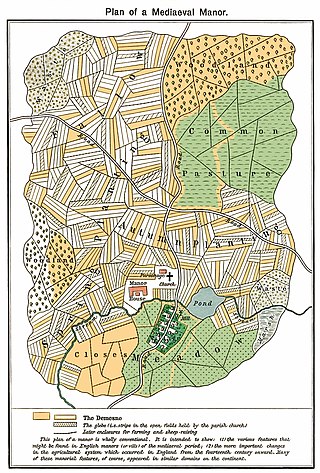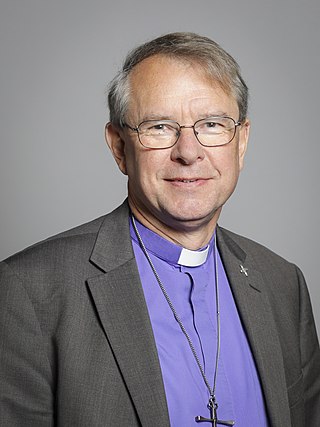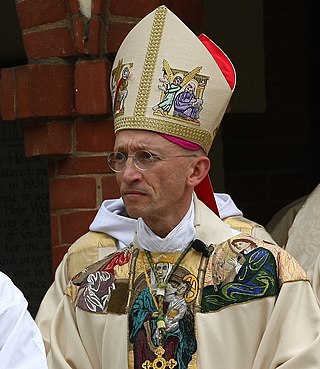
The Church of England is the established Christian church in England and the Crown Dependencies. It is the origin of the Anglican tradition, which combines features of both Reformed and Catholic Christian practices. Its adherents are called Anglicans.

Glebe is an area of land within an ecclesiastical parish used to support a parish priest. The land may be owned by the church, or its profits may be reserved to the church.
A benefice or living is a reward received in exchange for services rendered and as a retainer for future services. The Roman Empire used the Latin term beneficium as a benefit to an individual from the Empire for services rendered. Its use was adopted by the Western Church in the Carolingian era as a benefit bestowed by the crown or church officials. A benefice specifically from a church is called a precaria, such as a stipend, and one from a monarch or nobleman is usually called a fief. A benefice is distinct from an allod, in that an allod is property owned outright, not bestowed by a higher authority.

A prebendary is a member of the Catholic or Anglican clergy, a form of canon with a role in the administration of a cathedral or collegiate church. When attending services, prebendaries sit in particular seats, usually at the back of the choir stalls, known as prebendal stalls.
Advowson or patronage is the right in English law of a patron (avowee) to present to the diocesan bishop a nominee for appointment to a vacant ecclesiastical benefice or church living, a process known as presentation.
The Bishop of Sherborne is an episcopal title which takes its name from the market town of Sherborne in Dorset, England. The see of Sherborne was established in around 705 by St Aldhelm, the Abbot of Malmesbury. This see was the mother diocese of the greater part of southwestern England in Saxon times, but after the Norman Conquest was incorporated into the new Diocese of Salisbury. The title Bishop of Sherborne is now used by the Church of England for a suffragan bishop in the Diocese of Salisbury.

The Church Commissioners is a body which administers the property assets of the Church of England. It was established in 1948 and combined the assets of Queen Anne's Bounty, a fund dating from 1704 for the relief of poor clergy, and of the Ecclesiastical Commissioners formed in 1836. The Church Commissioners are a registered charity regulated by the Charity Commission for England and Wales, and are liable for the payment of pensions to retired clergy whose pensions were accrued before 1998.
Cathedraticum is a specified sum of money to be paid annually toward a bishop. It is a mark of honour and a sign of subjection to the cathedral church, from which its name is derived.

Perpetual curate was a class of resident parish priest or incumbent curate within the United Church of England and Ireland. The term is found in common use mainly during the first half of the 19th century. The legal status of perpetual curate originated as an administrative anomaly in the 16th century. Unlike ancient rectories and vicarages, perpetual curacies were supported by a cash stipend, usually maintained by an endowment fund, and had no ancient right to income from tithe or glebe.

Paul Roger Butler is a retired British Anglican bishop and a former Lord Spiritual of the House of Lords. He was installed and enthroned in Durham Cathedral on 22 February 2014 and was the Bishop of Durham, the diocesan bishop of the Diocese of Durham, from 20 January 2014 to 29 February 2024. On 12 September 2013 it was announced that he had been appointed as bishop-designate of Durham He was previously bishop of Southwell and Nottingham. He was installed at Southwell Minster on 27 February 2010. He served as the suffragan bishop of Southampton in the Diocese of Winchester from 2004 until 2010.
The Archbishops' Council is a part of the governance structures of the Church of England. Its headquarters are at Church House, Great Smith Street, London.
Stephen David Conway SCP is a British Anglican bishop. Since July 2023, he has served as the Bishop of Lincoln; he was previously Bishop of Ely and Bishop of Ramsbury.
Paul Gavin Williams is a Church of England bishop. Since May 2015, he has been the Bishop of Southwell and Nottingham; from 2009 to 2015, he was the Bishop of Kensington, an area bishop in the Diocese of London.

Vicar is a title given to certain parish priests in the Church of England and other Anglican churches. It has played a significant role in Anglican church organisation in ways that are different from other Christian denominations. The title is very old and arises from the medieval arrangement where priests were appointed either by a secular lord, by a bishop or by a religious foundation. Historically, but no longer, vicars share a benefice with a rector to whom the great tithes were paid. Vicar derives from the Latin vicarius meaning a substitute.

Martin Clive Warner is an Anglican bishop in England. He is currently the Bishop of Chichester.
Martyn James Snow is a British Anglican bishop. Since 2016, he has been the Bishop of Leicester. He previously served as Bishop of Tewkesbury from 2013 to 2016, and as Archdeacon of Sheffield and Rotherham from 2010 to 2013.
Jonathan Robert Gibbs, is an Anglican prelate.
Stephen Peter Race SSC is a British Anglican Bishop. Since 2022, he has been the Bishop of Beverley, the Provincial Episcopal Visitor for traditionalist Anglo-Catholics in the Church of England's Province of York.